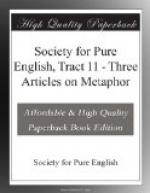II. SOME NOTES ON METAPHOR IN JOURNALISM
Live and dead metaphor; some pitfalls; self-consciousness and mixed metaphor.
1. Live and Dead Metaphor.
In all discussion of metaphor it must be borne in mind that some metaphors are living, i.e. are offered and accepted with a consciousness of their nature as substitutes for their literal equivalents, while others are dead, i.e. have been so often used that speaker and hearer have ceased to be aware that the words are not literal: but the line of distinction between the live and the dead is a shifting one, the dead being sometimes liable, under the stimulus of an affinity or a repulsion, to galvanic stirrings indistinguishable from life. Thus, in The men were sifting meal we have a literal use of sift; in Satan hath desired to have you, that he may sift you as wheat, ‘sift’ is a live metaphor; in the sifting of evidence, the metaphor is so familiar that it is about equal chances whether sifting or examination will be used, and a sieve is not present to the thought—unless, indeed, some one conjures it up by saying All the evidence must first be sifted with acid tests, or with the microscope; under such a stimulus our metaphor turns out to have been not dead, but dormant. The other word, examine, will do well enough as an example of the real stone-dead metaphor; the Latin examino, being from examen the tongue of a balance, meant originally to weigh; but, though weighing is not done with acid tests or microscopes any more than sifting, examine gives no convulsive twitchings, like sift, at finding itself in their company; examine, then, is dead metaphor, and sift only half dead, or three-quarters.
2. Some pitfalls. A, Unsustained Metaphor; B, Overdone Metaphor; C, Spoilt Metaphor; D, Battles of the Dead; E, Mixed Metaphor.
A. Unsustained Metaphor
He was still in the middle of those twenty years of neglect which only began to lift in 1868. The plunge into metaphor at lift, which presupposes a mist, is too sudden after the literal twenty years of neglect; years, even gloomy years, do not lift.
The means of education at the disposal of the Protestants and Presbyterians of the North were stunted and sterilized. ’The means at disposal’ names something too little vegetable or animal to consort with the metaphorical verbs. Education (personified) may be stunted, but means may not.
The measure of Mr. Asquith’s shame does not consist in the mere fact that he has announced his intention to ... Metaphorical measuring, like literal, requires a more accommodating instrument than a stubborn fact.
B. Overdone Metaphor
The days are perhaps past when a figure was deliberately chosen that could be worked out with line upon line of relentless detail, and the following well-known specimen is from Richardson:—




